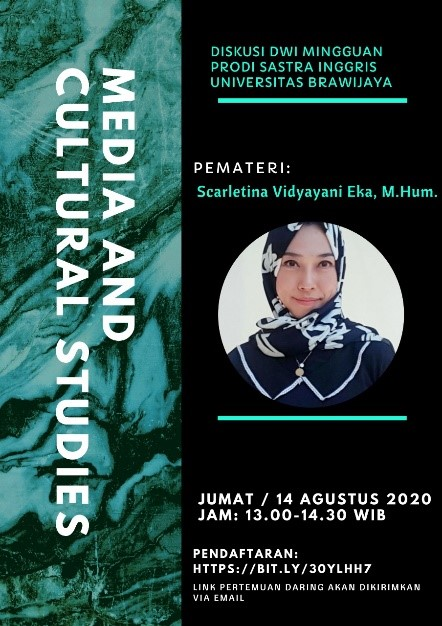Study Program of English Literature Faculty of Cultural Studies Brawijaya University held another biweekly discussion with “Media and Cultural Studies” as the topic on Friday (8/14/2020). The topic was delivered by Scarletina Vidyayani Eka, M.Hum., also known as Avid, who is a lecturer at Study Program of English Literature FCS UB.
The discussion began at 1 p.m. with Juliati, M.Hum., as the moderatorAvid began up the discussion by outlining how media might be viewed as texts in cultural studies. She stated that culture is similar to language, and that writings may be used to express oneself. Then she went on to discuss cultural studies, emphasizing how cultural practice has a specific meaning and how, in the age of technology, practically every social-cultural reality is mediated, making representation unavoidable. As a result, media plays a significant role in cultural studies.
The discussion then moved on to the main topic “Cultural Studies and Media”. According to Avid, today’s mass media, which is aided by technology, has evolved into popular culture. Popular culture has evolved into a new literary paradigm that includes mass media, electronic media, and even social media. She also emphasized how media texts may be interpreted through a cultural circuit which aims to understand a cultural practice from production to consumption to regulation to representation to identity.
Avid also provided instances of media and culture studies analyses conducted by both lecturers and students. There are representations of the film “Joker,” as well as analyses of Korean halal food, the Tess Daly YouTube channel, and the Djakarta Warehouse Project (DWP). These examples showed how seemingly insignificant items in everyday life can hold a message or significance that can be understood in the same way that a literary work can be read. This is possible because, similar to how a literary work can be used to say or represent anything, small things in everyday life can likewise be used to express or represent something. As Avid puts it, “Small things in everyday life can also become an object of literary research”.
Following the presentation, a question-and-answer period began. The question-and-answer session allows attendees to learn more about a topic or ask a question about anything that was unclear during the presentation. This biweekly conversation not only provided new insights, but it also inspired both lecturers and students to begin media study from a cultural studies perspective.
(FCS)


